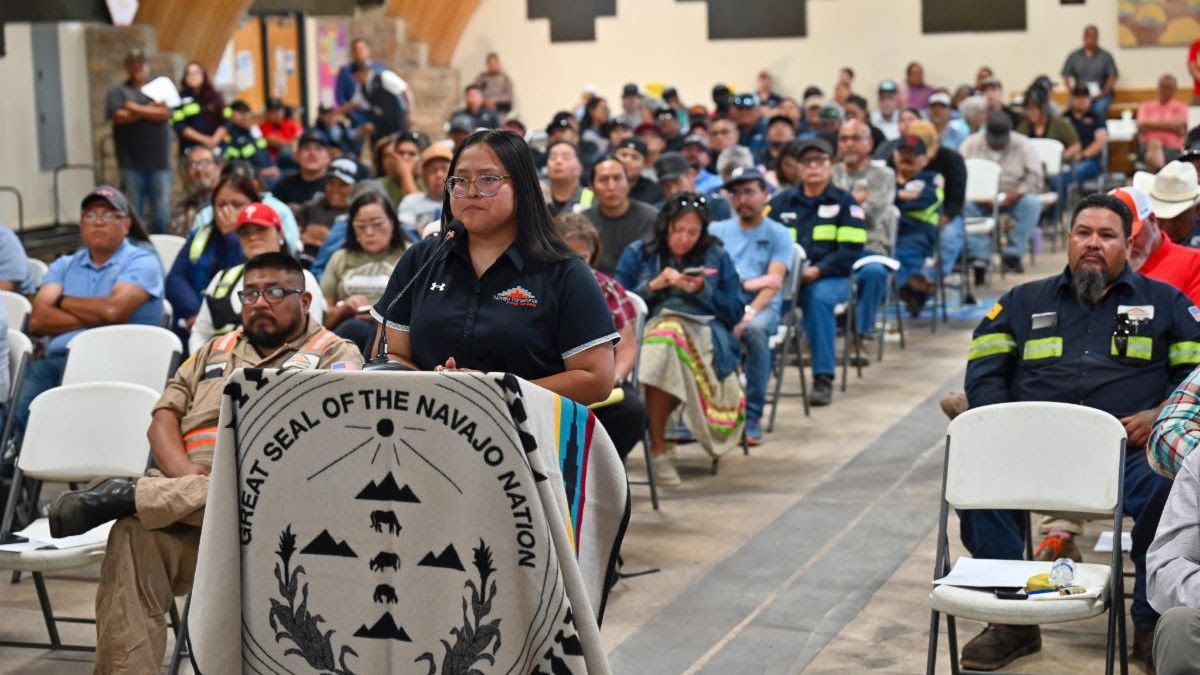
- Details
- By Native News Online Staff
Navajo Nation citizens shared a range of opinions on former President Donald Trump’s executive order, “Reinvigorating America’s Beautiful Clean Coal Industry,” during a public hearing hosted by the 25th Navajo Nation Council on Thursday at the Nenahnezad Chapter House.
This was the second hearing held by the Council, following a May session at Forest Lake Chapter—an area near the now-closed Kayenta Mine, which once supplied coal to the Navajo Generating Station. The Nenahnezad community is located near the still-operating Navajo Mine and Four Corners Power Plant, both major employers and sources of revenue for the Nation.
The hearing drew over 250 attendees, with around 90 individuals offering public comments. Many voiced strong support for the executive order, particularly those with direct ties to the mining industry. Supporters emphasized the economic benefits coal has historically provided, including jobs, education opportunities, and scholarships for Navajo families. For many, coal has offered a pathway to financial stability and upward mobility.
Miners shared personal stories about the impact of recent mine closures and the shutdown of the Navajo Generating Station. Some were forced to relocate for work or leave the Nation altogether, leading to family and community disruptions.
However, not all attendees supported the executive order. Others raised concerns about the long-term sustainability of relying on extractive industries. Some stressed the importance of Navajo sovereignty in managing land and resources, warning that dependency on coal could hinder future self-determination.
Environmental and health issues were also central to the discussion. Several speakers pointed to elevated rates of respiratory illness, including lung cancer among former miners, and urged leaders to weigh these harms against potential economic gains.
The hearing reflected the complex and often conflicting views within the Navajo Nation about coal’s legacy and future—balancing the need for economic stability with concerns over environmental health and self-governance.
Community input continues to play a vital role in guiding the direction of future policy decisions, according to Navajo Nation Council Speaker Curley.
“The Council is taking an objective approach to gain input and to hear directly from those who have been impacted and benefited from the Nation’s coal industry. The views that were shared in Forest Lake are different than the majority of the views that we heard today in Nenahnezad. It’s important that we listen to our Navajo people. Your voices matter. You have the right to be heard by leadership and to help shape the future of our Nation,” said Speaker Crystalyne Curley.
President Trump’s executive order, signed on March 20, 2025, aims to accelerate domestic production of critical minerals by streamlining permitting, financing, and federal land use processes.
More Stories Like This
NCAI Passes Two Emergency Resolutions on Immigration Enforcement ActivitiesChickasaw Lighthorse Police Officer named Indian Country Law Enforcement Officer of the Year
Indian Gaming Association Rallies Broad Coalition Against Sports Event Contracts It Calls Illegal Threat to Tribal Sovereignty
Navajo Resources and Development Committee Issues Notice on Livestock Inspection Requirements
American Prairie, Tribal Coalition Files Protest Over Rescinded Grazing Rights
Help us defend tribal sovereignty.
At Native News Online, our mission is rooted in telling the stories that strengthen sovereignty and uplift Indigenous voices — not just at year’s end, but every single day.
Because of your generosity last year, we were able to keep our reporters on the ground in tribal communities, at national gatherings and in the halls of Congress — covering the issues that matter most to Indian Country: sovereignty, culture, education, health and economic opportunity.
That support sustained us through a tough year in 2025. Now, as we look to the year ahead, we need your help right now to ensure warrior journalism remains strong — reporting that defends tribal sovereignty, amplifies Native truth, and holds power accountable.
 The stakes couldn't be higher. Your support keeps Native voices heard, Native stories told and Native sovereignty defended.
The stakes couldn't be higher. Your support keeps Native voices heard, Native stories told and Native sovereignty defended.
Stand with Warrior Journalism today.
Levi Rickert (Potawatomi), Editor & Publisher


